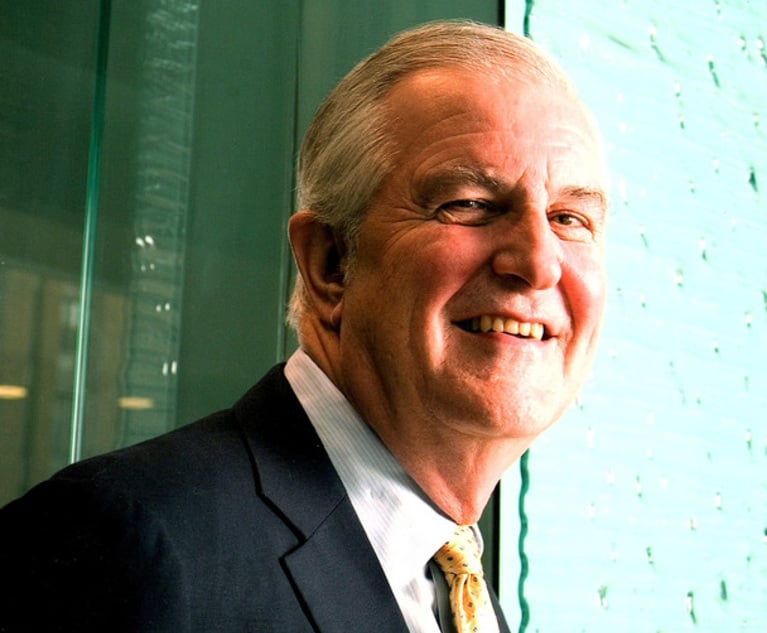Succession Still a Struggle for Law Firms, States New Study
A new survey by ALM Legal Intelligence finds that a third of law firms don't have succession plans for leadership or client relations.
November 15, 2017 at 06:45 AM
6 minute read

Succession planning is arguably one of the most important pieces of law firm management.
But a new analysis by ALM Legal Intelligence (ALI) states that less than half of respondents do not have a plan for a change in law firm leadership.
The study, “Securing the Future: Law Firm Succession Planning and the Challenges of Managing a Multigenerational Workforce,” elicited more than 100 responses from law firm leaders across the United States and the U.K., and resulted in interviews with the heads of firms, new partners and industry experts about their respective succession plans.
The study found that law firms continue to struggle with succession planning, which is indicative of a wider problem they face in managing the employee lifecycle, said Daniella Isaacson, author of the report and a senior legal analyst at ALI.
“Many law firms are not formalizing their succession planning process, in direct contradiction to the very same advice they give clients,” Isaacson said.
ALI found that a third of respondents do not have a succession plan for either firm leadership or client teams.
The data also showed that nearly 40 percent of those respondents who said they didn't have a plan in place for firm leadership reasoned that it was “not an immediate concern.” In addition, 49 percent of those respondents who said they didn't have a plan in place for client team leadership said this was because they had “difficulty identifying successors” and “faced resistance from senior partners.”
And this lack of planning has hit law firms right where it counts most: their pockets.
The study found that 52 percent of law firm leaders said they lost at least a quarter of a retiring partner's book of business on average when they left the firm.
“It became clear in our research that law firms are relying on individual partners to succession plan, but giving them absolutely no incentive to do so,” Isaacson said. “It is not shocking that partners are not unilaterally doing this for the good of the firm.”
This overall lack of succession planning is harmful to all firms but tends to hit firms in the Am Law Second Hundred the hardest. The ALI report found that Second Hundred firms routinely struggle to transition retiring partners out of practices. They are also becoming increasingly reliant on the income partnership tier and face chronic low leverage.
This is particularly troubling as those Second Hundred firms have higher percentages of baby boomers in their ranks than those in the Am Law First Hundred, the ALI report noted.
However, developing a succession plan isn't the only thing that law firms need to do to face this issue head-on, according to ALI. Succession planning must be combined with hiring and retaining a multi-generational workforce that leverages diverse viewpoints and perspectives.
“Succession planning does not just involve helping retiring partners transition out of the firm,” Isaacson said. “It comes hand-in-hand with better management of the multi-generational workforce: Including training and developing young talent.”

Succession planning is arguably one of the most important pieces of law firm management.
But a new analysis by ALM Legal Intelligence (ALI) states that less than half of respondents do not have a plan for a change in law firm leadership.
The study, “Securing the Future: Law Firm Succession Planning and the Challenges of Managing a Multigenerational Workforce,” elicited more than 100 responses from law firm leaders across the United States and the U.K., and resulted in interviews with the heads of firms, new partners and industry experts about their respective succession plans.
The study found that law firms continue to struggle with succession planning, which is indicative of a wider problem they face in managing the employee lifecycle, said Daniella Isaacson, author of the report and a senior legal analyst at ALI.
“Many law firms are not formalizing their succession planning process, in direct contradiction to the very same advice they give clients,” Isaacson said.
ALI found that a third of respondents do not have a succession plan for either firm leadership or client teams.
The data also showed that nearly 40 percent of those respondents who said they didn't have a plan in place for firm leadership reasoned that it was “not an immediate concern.” In addition, 49 percent of those respondents who said they didn't have a plan in place for client team leadership said this was because they had “difficulty identifying successors” and “faced resistance from senior partners.”
And this lack of planning has hit law firms right where it counts most: their pockets.
The study found that 52 percent of law firm leaders said they lost at least a quarter of a retiring partner's book of business on average when they left the firm.
“It became clear in our research that law firms are relying on individual partners to succession plan, but giving them absolutely no incentive to do so,” Isaacson said. “It is not shocking that partners are not unilaterally doing this for the good of the firm.”
This overall lack of succession planning is harmful to all firms but tends to hit firms in the Am Law Second Hundred the hardest. The ALI report found that Second Hundred firms routinely struggle to transition retiring partners out of practices. They are also becoming increasingly reliant on the income partnership tier and face chronic low leverage.
This is particularly troubling as those Second Hundred firms have higher percentages of baby boomers in their ranks than those in the Am Law First Hundred, the ALI report noted.
However, developing a succession plan isn't the only thing that law firms need to do to face this issue head-on, according to ALI. Succession planning must be combined with hiring and retaining a multi-generational workforce that leverages diverse viewpoints and perspectives.
“Succession planning does not just involve helping retiring partners transition out of the firm,” Isaacson said. “It comes hand-in-hand with better management of the multi-generational workforce: Including training and developing young talent.”
This content has been archived. It is available through our partners, LexisNexis® and Bloomberg Law.
To view this content, please continue to their sites.
Not a Lexis Subscriber?
Subscribe Now
Not a Bloomberg Law Subscriber?
Subscribe Now
NOT FOR REPRINT
© 2025 ALM Global, LLC, All Rights Reserved. Request academic re-use from www.copyright.com. All other uses, submit a request to [email protected]. For more information visit Asset & Logo Licensing.
You Might Like
View All
Demand Growth to 'Likely Weaken' in 2025 After 'Anomalies' Propelled Big Law Profits in 2024
5 minute read

Capital Markets Partner Rejoins O’Melveny Ahead of Expected Uptick in Demand

KPMG Law Seeks Alternative Business License, Shaking Up Legal Status Quo
3 minute readTrending Stories
- 1The Appropriate Exemption in Students for Fair Admissions v. President & Fellows of Harvard College
- 2DOJ, 10 State AGs File Amended Antitrust Complaint Against RealPage and Big Landlords
- 3New Partners at Cummings & Lockwood, Carmody Torrance Sandak & Hennessey
- 4'Extra Government'?: NY Top Court Eyes Ethics Commission's Constitutionality
- 5South Texas College of Law Houston Selects New Dean
Who Got The Work
Michael G. Bongiorno, Andrew Scott Dulberg and Elizabeth E. Driscoll from Wilmer Cutler Pickering Hale and Dorr have stepped in to represent Symbotic Inc., an A.I.-enabled technology platform that focuses on increasing supply chain efficiency, and other defendants in a pending shareholder derivative lawsuit. The case, filed Oct. 2 in Massachusetts District Court by the Brown Law Firm on behalf of Stephen Austen, accuses certain officers and directors of misleading investors in regard to Symbotic's potential for margin growth by failing to disclose that the company was not equipped to timely deploy its systems or manage expenses through project delays. The case, assigned to U.S. District Judge Nathaniel M. Gorton, is 1:24-cv-12522, Austen v. Cohen et al.
Who Got The Work
Edmund Polubinski and Marie Killmond of Davis Polk & Wardwell have entered appearances for data platform software development company MongoDB and other defendants in a pending shareholder derivative lawsuit. The action, filed Oct. 7 in New York Southern District Court by the Brown Law Firm, accuses the company's directors and/or officers of falsely expressing confidence in the company’s restructuring of its sales incentive plan and downplaying the severity of decreases in its upfront commitments. The case is 1:24-cv-07594, Roy v. Ittycheria et al.
Who Got The Work
Amy O. Bruchs and Kurt F. Ellison of Michael Best & Friedrich have entered appearances for Epic Systems Corp. in a pending employment discrimination lawsuit. The suit was filed Sept. 7 in Wisconsin Western District Court by Levine Eisberner LLC and Siri & Glimstad on behalf of a project manager who claims that he was wrongfully terminated after applying for a religious exemption to the defendant's COVID-19 vaccine mandate. The case, assigned to U.S. Magistrate Judge Anita Marie Boor, is 3:24-cv-00630, Secker, Nathan v. Epic Systems Corporation.
Who Got The Work
David X. Sullivan, Thomas J. Finn and Gregory A. Hall from McCarter & English have entered appearances for Sunrun Installation Services in a pending civil rights lawsuit. The complaint was filed Sept. 4 in Connecticut District Court by attorney Robert M. Berke on behalf of former employee George Edward Steins, who was arrested and charged with employing an unregistered home improvement salesperson. The complaint alleges that had Sunrun informed the Connecticut Department of Consumer Protection that the plaintiff's employment had ended in 2017 and that he no longer held Sunrun's home improvement contractor license, he would not have been hit with charges, which were dismissed in May 2024. The case, assigned to U.S. District Judge Jeffrey A. Meyer, is 3:24-cv-01423, Steins v. Sunrun, Inc. et al.
Who Got The Work
Greenberg Traurig shareholder Joshua L. Raskin has entered an appearance for boohoo.com UK Ltd. in a pending patent infringement lawsuit. The suit, filed Sept. 3 in Texas Eastern District Court by Rozier Hardt McDonough on behalf of Alto Dynamics, asserts five patents related to an online shopping platform. The case, assigned to U.S. District Judge Rodney Gilstrap, is 2:24-cv-00719, Alto Dynamics, LLC v. boohoo.com UK Limited.
Featured Firms
Law Offices of Gary Martin Hays & Associates, P.C.
(470) 294-1674
Law Offices of Mark E. Salomone
(857) 444-6468
Smith & Hassler
(713) 739-1250








